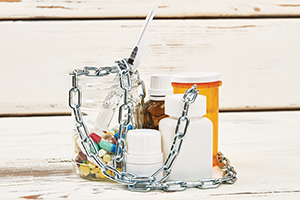Son Undergoing Addiction Treatment

Meng En (a pseudonym*) shared that her 20-year-old son experienced a relapse in his drug addiction this February and has been in and out of hospitals in British Columbia multiple times. According to Meng En's account, her son was referred to a government-run short-term addiction treatment center. However, each time his cravings became unbearable, he would sign himself out and leave. He even resorted to "ordering takeout," calling drug dealers to deliver drugs to his home or even to the hospital. Under the current system, there seems to be no way to compel him to undergo addiction treatment.

After his second hospitalization, I asked the specialist what would happen if he tried to jump again after returning home. The doctor referred him to a short-term addiction treatment program, but this program required voluntary participation, allowing patients to leave at any time if they chose."
Her son stayed at the treatment center for five days before being discharged, as the center deemed him "stable." What Meng En found most incomprehensible was that her son had drugs on him when admitted, and upon discharge, the hospital returned the drugs to him. "I truly cannot understand this practice."
After leaving the center, her son stayed at an Airbnb arranged by his mother and later moved to a friend's house. A few days later, his addiction resurfaced. His friend told him to choose between rehab and homelessness. He then wandered the streets with a bag of clothes, somehow managing to get drugs on credit from dealers despite his addiction. After using drugs, he called the police himself, claiming he wanted to commit suicide, and was taken to the hospital.
This marked his third emergency room visit within a month. After two days of hospitalization, the doctor recommended he remain in care and referred him to a psychiatric addiction treatment program. However, this program required a three-month wait and voluntary participation. Meng En felt that such "free-entry-and-exit" rehabilitation programs were meaningless. As expected, her son signed himself out again the next day, leaving Meng En feeling "helpless."
After leaving the hospital, Meng En and her friend insisted that he not return home and urged him to go to a Gospel addiction treatment center. He stayed there for one night but left the next day at 11 a.m. when his addiction flared up again, wandering the streets once more.
At 6 p.m. that evening, the hospital called to inform Meng En that her son had been admitted again. After being discharged, he begged to return home, still carrying drugs. Meng En suspected that he had ordered drugs while in the emergency room, with dealers delivering them to the hospital. She told her son to seriously consider his options, emphasizing that the Gospel addiction treatment center was his last chance and that the family would no longer support his drug use. On March 1, her son re-entered the Gospel addiction treatment center.
Meng En sternly warned her son never to touch such substances again, emphasizing that they could ruin lives and were extremely dangerous. However, her son dismissed her concerns. "He even went online to 'educate' himself, claiming that ketamine was harmless and that only methamphetamine and heroin were dangerous."
Yet, during his recent hospitalization, tests revealed fentanyl in his system. Meng En said her son even complained that the dealer had falsely advertised the purity of the ketamine, which was actually laced with fentanyl to deceive customers. Feeling helpless, Meng En remarked, "Using drugs is inherently wrong, but he doesn’t see any issue with his drug use. Instead, he blames the dealers."
Meng En believed her son’s natural tendency toward anxiety might have made him turn to drugs for relaxation. She also felt that societal attitudes had misled her son about drugs: "How can drugs be categorized as legal or illegal? And calling marijuana a 'recreational' drug—drugs are drugs. I can’t understand what kind of society this is! Young people are so naive; their knowledge is insufficient to grasp reality or make sound judgments. In Canada, buying drugs is so easy, practically at your fingertips. Drugs cost about the same as a meal—what a 'classic' situation!"
Meng En felt that society offered no real solutions to the drug problem: "In hospitals and government-run addiction centers, drug users can leave whenever they want. Some rehab programs have a three-month waitlist. In such cases, forget three months—even three days can be fatal."
She recalled how her son, during his early stages of addiction, would suffer excruciating withdrawal symptoms, experiencing full-body pain and chills that drove him to madness. Many times, he even contemplated jumping off a building to end his suffering.
During those early days, when withdrawal became unbearable, her son had asked her to find a place for him to detox. They once visited a private rehab center that charged $6,000 per month. However, Meng En noted that the other patients there seemed to be in worse condition than her son, so they decided against leaving him there.
Four years later, as her son began to adapt to life in Canada, Meng En started working. During high school, her son temporarily dropped out, worked for a short period, and later expressed his desire to return to school. Meng En enrolled him in a private high school, where he completed his education and eventually gained admission to a university business program. At that time, she felt a sense of relief, believing everything was back on track.
To help her son focus on his studies, Meng En purchased a Tesla for him and paid $700 per month for insurance. Since he wasn’t living at home, she provided him with $50 daily for food and allowance. Reflecting on this now, she feels overwhelmed with guilt. “Did giving him this money harm him? Was it used for meals or drugs?”
Although her son is now at the Gospel addiction treatment center, Meng En remains deeply anxious. “I feel like I’m carrying a ticking time bomb—I don’t know when it will explode. How long will this cycle of addiction relapse continue? Should I sell the condo to keep him from jumping off a building? I have endless thoughts and no ability to face what’s ahead. I don’t even feel I have the right to think about death.”
Meng En admitted that she cannot share these struggles with close friends or relatives, as she does not want to upset them. However, she is grateful for the support of her church brothers and sisters. Her health has deteriorated, and her heart condition has worsened. “Every time I think about my son, my entire body trembles, and my heart races uncontrollably.”
She shared that she relies on audio recordings of the Bible at night to help her sleep, but even then, she only manages to rest for about an hour before waking up. She has lost her appetite entirely and can only force food into her mouth, swallowing it with water. “I don’t feel like eating—I’m just trying to sustain my life.”
“At the time, I didn’t understand the significance, but now I realize how challenging the path out of Egypt truly is!” Later, her son was baptized and told her that when he looked at the cross at home, it felt miraculous—even using drugs no longer brought any sensation. “God did indeed work in him, but sadly, he couldn’t hold firm in the end.”
Meng En shared that she prays for her son on her knees every day. Her decision to speak out in this interview stems from her hope that others will not endure what she has faced. She concluded the interview with this prayer:

 Shirley Chan
Shirley Chan





